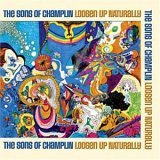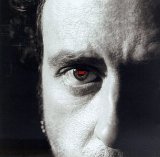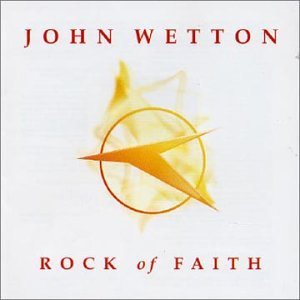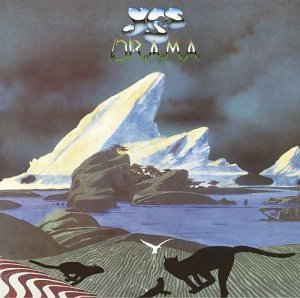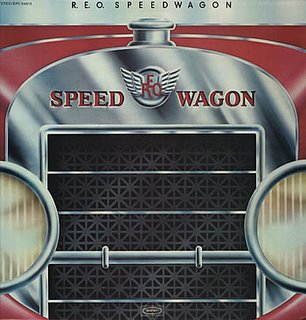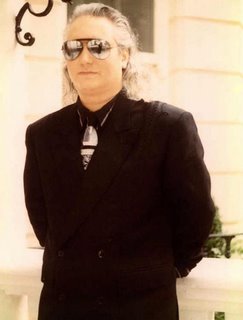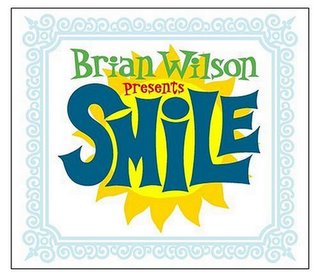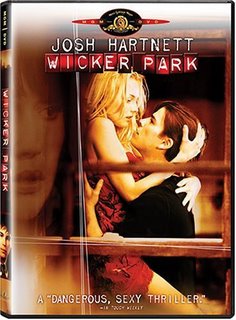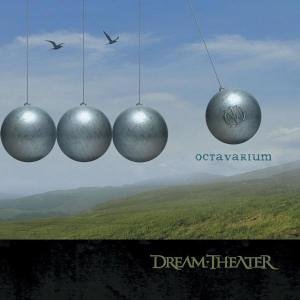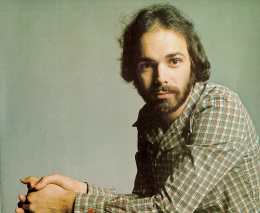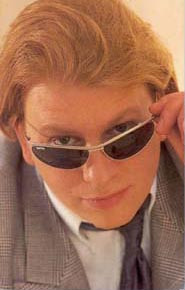 What made you decide to pursue a career in the music business?
What made you decide to pursue a career in the music business?Well, I guess the proper answer would be that there was no way to avoid it. I was raised in a musical family. My father was a composer. My mom was a singer. My grandmother, my mom's mother, was an acting coach and an actress. My mom's father was a voiceover artist from early radio. My dad's father was a drummer. And [I] was just surrounded by music all my life and showbiz people and that kind of thing. I grew up with it so it was the natural way to go. There was a time when I just graduated high school that I actually wanted to go in the Air Force and fly jets. But that changed as soon as I got work doing McDonald's commercials, started making some money figured this is what I ought to be doing.
Who are your biggest musical influences?I guess early on as a singer I would say the Beatles of course, Stevie Wonder. I was also influenced a lot by Led Zeppelin and Robert Plant- his singing style. I think more than anything probably the Beatles, Beach Boys, lots of groups that had a lot of good harmonies I guess were the ones that really influenced me.
Little River Band? At All?Not really- later on but not really in the beginning.
In 1982, What You're Missing showed up on Chicago 16. Was that a song that would've gone on your debut had Chicago not used it?Most definitely. Yeah that song was written. It was the first song I ever wrote with Jay Gruska who produced my album and who is also a part of Maxis, and was also later on married to my sister. That was the first song we ever sat down and wrote together I believe. And that was the first song I ever really had covered by anybody. I was working for Twentieth Century Fox Publishing and it was really sort of an assignment just to get a song written and see what would happen with it. I think if they hadn't covered it, I probably would have done it.
How did it feel the first time you heard it on the radio or just on their CD?It was exciting. It was great. It felt very exciting. It felt like a real accomplishment.
How did you feel when you got the call saying you were in Toto?I felt scared (laughs) a little bit scared, relieved. Because at the time I was living on my own I didn't really have very much money, didn't have a whole lot going right at that time career wise. And I had just come off of a couple of different jobs. I was actually at the time working for Jeffrey Osborne but the tour was over and there wasn't much going on with that and when the opportunity came up to audition and stuff I was real excited and when I got the job I thought I had it made.
Could you share the story?Sure, the story of the auditions?
And how you got referred by Jason [Scheff].Yeah well, Jason Scheff, as you know is the singer and bass player for Chicago, was at that time I think a closer friend to my brother than anybody. I mean he wasn't really a close friend of mine at that time he was a friend of my brother's. I believe the sequence of events was that he, that Jeff Porcaro asked Jason if he wanted to come and audition for Toto and he had just gotten the job with Chicago and suggested to Jeff that he ask me. The Toto guys basically knew me and knew our family. The Porcaro brothers father works with my dad still quite a bit. And David Paich's father also worked with my father in their younger years quite a bit so the families all knew each other. They knew I was a singer and Jason made the referral and I think I was contacted first by Jason just to let me know that he had suggested me and a little time went by and I got a call, I think from Jeff asked me to come in and audition. I knew they were looking at a couple of different guys at that time to take over the singing job but obviously I was real excited about it. So I went over to Jeff's house and they were in the middle of actually they were just getting started working on the "Fahrenheit" album and they had recorded and almost completed two songs already on that record. The first one that they had already almost completed was I'll Be Over You which ended up being the first single and the jazz cut with Miles Davis. They had already done those songs and they had a bunch of other songs in the works. One of them was a real kind of techno-poppy piece of music that had no lyrics and had no melody. It was just sort of a techno-pop piece of music that they had put together. I think it was the first time Toto really ever experimented doing a song with drum machines as well as Jeff playing but it was very techno. So I went into the studio and I started doing my best Michael Jackson imitation and started coming up with some melodies and some lyrics for it sort of on the spot and they liked what I did and they were excited about it and that was basically the first audition. Then a couple of days later they invited me to go down to a rehearsal studio and play with them in a live setting and hear how I could sing some of their hits that they had already had ‘cause I guess they needed to see how I was going to sing live. And part of what I used to do when I worked in Vegas was imitations of other singers and I was always a big fan of Bobby Kimball's and a big fan of Toto's so I went into the rehearsal hall and did a pretty good imitation of Bobby Kimball. [I] made everybody laugh and they liked the fact that I could sound pretty close to him. So that one went pretty well and then a couple of weeks went by and they had made their decision and Jeff called me up and told me that I was his singer.
When you were in Toto how was it decided who would sing lead on each song?Well it depends on who wrote it, of course. Most of the things Steve Lukather wrote, were y'know he wrote for himself to sing. Every once in awhile he and Dave would come up with something that they had intended for me to sing. For the most part the guys really wanted someone else to be the main singer whether or not they wrote the tunes or not. They were lookin', I mean even though in the early days of Toto three guys really shared all the vocals. Dave did vocals and Bobby Kimball did vocals, and Steve Lukather did vocals. I think they were lookin' to try to get away from that a bit and really just have one guy who could just be center stage and handle most of the singing. So when I came in they were looking for somebody who could not only write songs but could sing the songs that everybody else was writing too. Like I said, Steve Lukather always had at least a song or two on each album with himself as the lead singer. And Dave Paich at that time was really no longer in doing much singing himself so everything he was writing or co-writing was meant for me to sing.
Are there any interesting or humorous stories about your time in Toto that you could share?Well probably the most interesting road story, there's several of them, but I mean the first couple that occurred when I was in the band on the first tour. That was for the "Fahrenheit" record I think it was nineteen late eighty-six or early eighty-seven. We were in Puerto Rico and about halfway through the show all the power died and we were out there on stage and the crowd was screamin' and the lights were still working but there was no power to any of the instruments. And one of the things I used to do is I used to carry a video camera with me everywhere and of course went back and pulled out my video camera and started running around on stage filming the audience trying to keep them entertained. And at one point I handed the camera to Lukather and did a strip tease on the stage while we had no power. That was probably one of the more humorous moments and probably a pretty interesting moment that most people know about is when we walked out on stage during that same tour in Hanover, Germany and Mike Porcaro slipped and shattered his elbow before we had even played the first note and he put the bass over his shoulders and manged to get through about four tunes and then he just couldn't do it any longer and Jeff had to get up and go stand out in front of the audience and tell them that Mike had broken his arm and that we were gonna have to stop and that was actually the last show on the Fahrenheit tour. And Mike was taken to a doctor and [he] put a cast on his arm and we all came home and that was the end of that tour and we had actually only missed I think two shows. We were supposed to go to Berlin, Germany from there and we never did and do a couple of shows in Berlin and obviously we didn't go. That was pretty interesting.
Just to quell the rumors, and you don't have to answer this one if you don't want to, would you explain the events leading to your departure from Toto?Well we talked about this a little the other night. There's lot's of different stories going around but I think the best, the most truthful way to describe what happened was this: Y'know we had come back to L.A. after the Fahrenheit tour and everybody in the band was real excited about having me in the group and the tour went really well and I talk about this with Steve Porcaro sometimes. And he was still in the band at that time. Those guys did a lot of talking sort of by themselves without really including me. I mean they were the original members of the band and they always really kind of were concerned about whoever was the singer because they had run into different difficulties with their other singers before so they were always kind of y'know having little meetings to assess the situation with the singer- that kind of thing. And Steve told me that y'know after the Fahrenheit album and after the Fahrenheit tour that everybody in the band was really really happy with me being in the band. They were happy with my performance live and everything and they felt, according to Steve, that this might be the guy who's really going to work for the band. And that was nice, it's not always nice to hear that. Following that "Fahrenheit" tour we came back to Los Angeles and started putting songs together for another album and I think of all the guys in the band at that time I think I had probably gotten the closest to David Paich and we hung out a lot and did a lot of songwriting together and that kind of thing and we also drank a lot. Y'know took some drugs and were bad boys and stayed up too late y'know I was pretty much over there pretty much every day. And during the course of that year or nine months or whatever that it took to write the songs and get ready to record the album for The Seventh One or the album which ended up being The Seventh One my health started to get a little bit poor because I had spent too much time partying and hanging out with Dave and I wasn't the only one either. Dave was not on top of is game either by the end of that nine months and the other guys in the band were not only a little bit bugged with my behavior but also with Dave's behavior because we hung out a little bit too much together and weren't taking very good care of ourselves. Anyway we went into the recording of The Seventh One album and it was a little bit different than working on the Fahrenheit album. I guess some of the excitement had worn off for me as far as being in the group it was all brand new when I first came in and first started working on the Fahrenheit album. By the time we got to The Seventh One album maybe I felt like it was a little bit more work and a little less play. Nevertheless though, we did have a pretty good time working on that album. There were a few little arguments and stuff like that but nothing out of the ordinary for a rock and roll band to go through.and I was just starting to get comfortable bein' with these guys and startin' to realize that I was actually really in the band. It took me a long time to really understand that. But anyway we worked on The Seventh One album and it went pretty well and I probably did some of my best singing ever on that record. The guys pushed me a little bit harder on that record, I think, than on the first one. The songs were a little bit more difficult to sing. I think the songs were maybe a little bit better, here and there, on that record. We also brought in a couple of producers to really work on that album with us: George Massenburg and Billy Payne. And when it came time to do lead vocals Dave was really in charge of producing me. And he pushed me pretty hard and we managed to get some really really great vocals on that album. But I think some of the other guys were starting to get concerned about whether or not I was gonna be able to keep it up, so to speak. And to some extent they were right. The problem being that I was letting it get to my head a little bit and wasn't taking very good care of myself. But I was still pretty much on the top of my game- singing wise. And then it came time for The Seventh One tour and we worked on and rehearsed a show that was a lot longer than the Fahrenheit tour. I think the show was two and a half hours or something like that. It had a lot of the Bobby Kimball songs and it had a lot- had a couple of the Fergie songs which I had never done live with them before. Some of the Fergie vocals were higher than the Bobby Kimball vocals and harder for me to sing. And we also had a lot of the songs I had done with them. Some songs off the Fahrenheit record and probably most of The Seventh One record. So it was a really tough show. The Seventh One tour each individual show was actually really hard for me to do. But it was an exciting show, it was a lot of fun. And the tour went pretty well for the first couple of months, the first couple of times out and I think by the time we got to Europe on that tour, my voice was starting to get a little bit tired and I probably wasn't really in the best of health but I was still managing to do the shows. Some of the guys used to complain that I wasn't sounding quite as good as I did on the Fahrenheit tour and that was for several reasons. Mainly because this show was much different. It was a lot harder and it was a lot more work singing wise and also I had become real close hang-out pals with David and we would go out and try and find things to do in all the different cities we went to so I was tired a lot more easily because of those two reasons. So I think what was starting to happen is that some of the other guys were starting to look for a reason to have a problem with me. Not necessarily me personally- they were starting to look for any reason they could to have a problem with the singer again and it didn't take very long for them to find that problem. What ended up happening is I ended up getting a really bad flu when we were out there on the road in Europe and leading up to one particular show, my voice started to get real tired. And eventually on one particular night, and it happened to be in Hanover, Germany again almost a year exactly from when Mike broke his arm. We went out on stage and I had no voice. My voice was gone. I was just so tired and had the flu and everything and I think that pretty much cinched it for the rest of the guys. They didn't have much patience for singers and stuff. And so they were just kinda lookin' for a reason to be upset and I handed ‘em one. So anyway my voice really didn't work that night.. And there's lots of stories goin' around that I sounded like a frog or whatever that kind of thing. The way I remember that particular show is going out on stage and opening my mouth and nothing coming out but air. It probably sounded more like the microphone was broken and that I was opening my mouth and nothin' coming out. So I ran back stage and the manager called the doctor who gave me a shot of something and I went back out on stage and managed to crawl my way through a couple of the hits from Toto IV and by the time that show was over the guys were really kind of pissed. One of the things that I felt bad about and I argued about was that at that time in Toto's career they couldn't really afford to cancel shows that one of the band members wasn't well- that kind of thing. A lot of times you'll hear about artists who play stadiums and theatres and stuff because they have a cold or some reason like that and then they change the dates and come back and do it another time. Toto was never really willing to do that and I think part of that had to do with money and commitments to some of these tour promoters and all that kind of stuff. I mean what should've happened is that a couple of shows should've been shifted around and some time off should've been taken when it was really obvious that I was starting to get sick. But they wouldn't allow that to happen- so I just went ahead and got sick and lost my voice. So it was that that sort of started this kind of anger between me and some of the guys. I thought they should've given me a little bit of a break and they felt that I should've gotten off my butt and taken better care of myself and we crawled our way through that tour. Did the few last shows that we needed to do and came back to Los Angeles. Took a couple of weeks off and then the last show I ever did with the band was in Minot, North Dakota and the managers had set up a private plane to take us over there and we flew over there and I sang fine and everything. But I think the guys had already decided that they were unhappy with me at that point. I could tell on the flight over there and on the flight back it felt kind of like an outsider. It became real obvious. There was one point actually in Europe during "The Seventh One" tour when I felt they were being a little bit hard on me and I told them I didn't really wanna be a part of a band that didn't care about the singer. But I quickly changed my mind when I realized it would be stupid to quit this job so I kind of changed my mind and told everyone I would take better care of myself and get back to how it was in the first tour I did with them, all that kind of stuff. And I was told by one of the guys in the band, probably I think it was Lukather or Dave or one of those guys, that the band was going to take a year off and then come back and start working on another album, that everybody was a little tired and they were gonna take some time off. And I said okay, that's fine. And then the next thing I heard was somebody, a friend or one of my family members called me and said they had read a press release that I had quit and that they were already getting a new singer. So that's how I found out I was out. Nobody from the band called me and actually said, "Okay look we're gonna go with somebody else." I heard from a third party that they had seen a press release that said I had actually quit. And that never really happened. I never formally quit the band. In any case, I made an effort to try and go up to David Paich's house and find out what was goin' on and none of the guys really wanted to talk to me and all that kind of stuff. And finally I called the management office and they told me about this guy, Byron, who was gonna be in the band. And that's how I found out I was out. For the most part that's the true story.
Many Toto fans out there really wouldn't mind seeing you back in the band. If any of the current members were to ask you to re-join, would you?0I'd probably have to think about it. But probably not for very long. I would love to play with those guys again and go out there and with them. Although, I don't think they'd ever ask me. They're coming out with a new record with a bunch of songs that were never released from not only the Bobby Kimball period but also a couple of songs off the sessions that I did with them and they're preparing to do some press touring and that kind of stuff and I know Bobby Kimball is going with them, but I haven't been asked. So, I doubt they would ever ask me to come back, but if they did I'd definitely think about it.
Could you tell the story of how you got the job in The Lion King doing the Adult Simba?Let's see, a couple of guys who I knew who worked over at Disney, one guy in particular, Chris Montan and the other guy's name was Andy Hill. They were acquaintances of mine. I didn't know them real well but they were working over at Disney in the music department puttin' together demos and songs and gettin' all the casting singers and stuff together for the Disney cartoon movies starting I think with Aladdin was the first one I think they worked on. And they actually called me when they were working on Aladdin and Chris Montan called me and said that they weren't happy with the guy who was doing the singing voice for Aladdin and would come down and try and imitate this guy and see if I could do a little bit of a better job. These guys mainly knew me from when I was doing imitations and stuff like that. So they sent me a tape of the guy who was doing the singing who was a very broadway kind of a singer, not really a pop or rock singer but he had a real broadway kind of a voice. And they wanted me to study it and try and sound like him but at the same time try and sing a little bit more like a pop singer. So I studied the tape and I went down there and I did my version of it. The directors were down there and some of the produers and stuff and they were all happy with what I did. Obviously, they told me there was no guarantee that I was gonna be the singing voice for Aladdin but they were just sort of trying looking at all their options and stuff and they wanted to see if they could get someone that everyone liked better than the original guy. The one person who did not like my performance but did like the performance of the more broadway guy was the composer- the guy who wrote the music- Alan Menken on Aladdin. So they stayed with that guy, they stayed with the original guy and I didn't get that job. So now jump, I guess a year and a half, almost two years later, Andy Hill calls me up and says, "okay we're doin' another Disney thing called The Lion King. Sorry we couldn't get you on Aladdin, and again there's no guarantee but can you come down to the studio. Elton John is writing the songs for this particular movie and he's not gonna be there but can you just come down to the studio and sing a couple of these songs just as demos- just sort of see what we've got. So I went down to the studio and I did a duet version of Can You Feel the Love Tonight which was the ballad from The Lion King. Sang it from top to bottom with this female singer- who I can't remember her name and we did a version of it and it was simply a demo it was just for them and for Disney to sort of see what the song was like and see if they liked it or if they wanted Elton to come up with something else or whatever. So I went and sang the demo and they paid me for the session and that was that and a year went by and they called me up again and they said, "okay, we're in production on the film the song is gonna be in the movie but it's not going to be sung from top to bottom like a ballad the character of Simba, the lion king, when he's an adult he's gonna sing a couple of lines of this sung like it's a thought, like his mouth's not gonna move. He's just gonna think his lines and Matthew Broderick is doing the speaking voice and although Matthew can sing we would like you to come in and just see if you can sound like Matthew but sing better. That kind of thing. And again there's no guarantee you're gonna be in the film but can you come down and do this?" So I said "sure." So I went down to the studio and they literally had two lines for me to sing in that song and I went in there and I listened to Matthew Broderick singing it and it sounded like Matthew Broderick speaking, really! He didn't have a bad voice, his pitch was good. He sounded fine but it sounded like him. It just sounded like the actor sort of speaking with a little bit of singing going on. And so, I even said to them, "This sounds fine, I don't know what you need me to do this for." And they said, "Well just give it a try." So I kinda tried to do a little bit of an imitation of him and I sang the two lines. And they said, "Okay that's good but now do it again and just sort of do it as yourself." And I did it again, and I sang the two lines and the two directors were there and they really liked what they heard. They thought it actually sounded more like Matthew than when I was trying to sound like him. So they were happy about that and again there was no guarantee that it was going to be in the movie. But while I was down there at the session the directors and the guy who was producing me who's a composer named Mark Menchina was producing the vocals on that movie. The decided to put up another song and give me a shot at it. There was maybe three or four lines in this particular song, the song was Hakuna Matata and the problem they were having with it was that it was out of range, it was too high, for Matthew Broderick to sing and it required a little bit more of a singer's kind of approach than it did just sort of an actor trying to sing. You know what I mean? Even though Matthew could sing. I mean I will say that he wasn't bad, he wasn't a bad singer- but rangewise it was pretty high so they put it up and I started to sing that thing. I learned it and I sang my couple of lines and then just for fun because I really wasn't even thinking about gettin' the job or anything or bein' in the movie. Just for fun I started doing some vocal licks, some riffs and stuff just for fun and I could see the directors and the producers in the other room just like laughing and jumpin' up and down and havin' a good ol' time listenin' to me do these licks and I think that's kind of what did it. I went into the control room at the studio and the directors were talking about how it was great and the loved the licks I was doin' and they were gonna animate the Lion's mouth to the licks that I was doing and they were really excited about it and stuff. And I said, "Great! I'm glad you like it." But they were a little bit concerned that it sounded nothing like Matthew. I just kinda said, "Okay, whatever! I had fun and thanks for askin' me to come down." And they paid me for the session and then another- I don't know- six months went by or something like that and I got a call from the legal department at Disney and they said, "We're sending you over a contract regarding your voice on the songs in The Lion King we need you to sign a contract for the release of the record and the movie and all that kind of stuff." And that was how I found I was in there- that they had kept me in the movie and that's pretty much how that went. And it just so happened that the album turned out to be a big hit. So, in a way,
The Lion King record is probably the biggest hit I've ever had. Obviously I didn't make anywhere near as much money as Elton John but they were very generous to me and they paid me pretty well for my very small performance in that movie and that's The Lion King story.
Many of your fans and many Toto fans are also fans of Chicago. Do you have any interesting stories about your sessions with Bill Champlin or Jason Scheff?Well every time I work with those guys it ends up being more laughing than working and both Jason and Bill have probably become two of my best friends and we do a lot of background singing together and whenever one guy gets a call for a background session, he always calls the other two guys. So we love to team up as a trio and do sessions together. Mainly, not because our voices are so great together but just because we have such a great time together. And I couldn't really come up with any one particular story that was funny or interesting. Just ‘cause every time I work with them it's funny. But all I can say is that many many times that we've done sessions together we've gotten into these laughing attacks that sometimes- one particular time lasted. . . Not even one time, probably ten times- these laughing attacks that last for half an hour before we can calm ourselves down to get back to work. So that's like a normal occurrence whenever I work with those guys.
On the European release of I Am Alive, you had "Afterlife" and I'll Never Let You Go. Afterlife sounds like it could've come from a film score, is that what it was originally intended for?Yeah, Afterlife was a piece of music that I came up with and I can't really remember if I ever really used it for any of the films I worked on, but it was definitely like a movie cue. I think I picked it because it was one of the more contemporary ideas that had some kind of a groove involved. So I figured since they were looking for a couple of extra bonus cuts for the record for the European release that I would offer them that. I don't think they were too happy with the fact that I offered them that, I think they wanted another vocal tune but I didn't really have anything ready to give them or anything. And I think part of the problem was that I had I think a couple of different movies that I was writing scores for at the time and didn't have a lot of extra time, so I just grabbed something that I had written and didn't use, I believe, and just included it in the package that we sent them for the bonus tracks. And I really wanted it to be on there also, myself, just to show a slightly different side.
When you write new material, you tend to work with other songwriters. How do songs usually come out? I mean, how does the songwriting process usually work for you?Well it depends, I generally write music. It wasn't always that way. When I first started writing songs I guess it was lyrics mostly in the very beginning. I wrote a couple of lyrics for my dad for a couple of movies and stuff when I was a teenager and that kind of thing. And I noodled around on the piano, coming up with music here and there. When I really started to get into it working for publishing companies as a songwriter I was introduced to a lot of writers to co-write with and some of them were lyricists and some of them were both y'know wrote music and wrote lyrics. And I found that when I got together with lyric writers that these guys really knew what they were doing and I wasn't as much of a poet as they were. So I decided that I was more interested in just coming up with the music and then either having a lyricist come up with lyrics or sometimes I'd co-write a song with somebody whose not really a lyricist but can do both and between the two of us, we'll do both. The perfect example is What You're Missing that I wrote with Jay Gruska. Y'know, he's not really a lyricist and I don't really consider myself a lyricist either but between the two of us we came up with the words for that. It's different every time. Sometimes I'll come up with a title and just start with that and then write a piece of music and then go to a lyricist and tell him the title and that's how Man In Me was written. I came up with the title and then went to Paul Gordon and he wrote the lyric in about fifteen minutes. So it's different every time.
Of all the material you've written, what are you most proud of?Well, musically I'm probably most proud of the stuff that I've written as a film composer. And songwise, I'm probably most proud of a couple of the tunes I wrote while I was in Toto. We Can Make It Tonight was mostly my tune so I'm pretty proud of that. That was on the Fahrenheit record. Pamela- I'm proud of that tune too, most people don't this, but actually you probably do, but a lot of people don't know that I had a girlfriend whose name was Pamela who I was really in love with. And this was like before I joined the band and I wrote a tune for her called Pamela- from top to bottom. [I] wrote all the music and I wrote the lyrics and I wrote it for her and I gave it to her. And the chorus of that tune- of my tune. It's actually a great tune, it's still a great tune- I still dig it, but the chorus of that tune- Well I'll tell you the story this way. Years later when we started writing songs for The Seventh One album David Paich came to me and he said, "I got an idea for a tune." and he had just about written the whole thing. He had the chorus, anyway and he had music for the verse. And his chorus went, "Pamela [singing]"- I mean that was the chorus and I said wait a minute. I wrote a song called "Pamela" and he said, "Okay whatever- this is my tune, do you want to work on it with me?" No, actually he didn't even ask me if I wanted to work on it. He just said, "This is my tune." And I said, "Well I wanna work on it with you because I had a girlfriend named Pamela and I wrote this tune Pamela from top to bottom." And I played him my version of the tune and he liked it. And what we ended up doing was taking the chorus of my version of Pamela and making that the bridge of the Toto Pamela. So the bridge that happens in the Toto Pamela was my original chorus in my version. And then I came up with the melody and most of the words for the verse of the Toto version. But the Toto version was still kinda mostly Dave's tune. But I'm proud of that one. I'm proud of the original one too. Not very many people have heard it, ‘cause it was just a demo and it was never released. [I'm] tryin' to find the master for that song actually. Haven't been able to find it. So I'm proud of that. I'm proud of What You're Missing because it was my first real attempt to write with another great songwriter and it was the first song that ever got covered. I'm proud of a song called Last Unbroken Heart that Patti LaBelle covered. ‘Cause that was mostly my tune too, I came up with the chorus for that and it came out pretty good. So I'm proud of that one too. I'm proud of a lot of stuff. I think musically speaking I'm probably most proud of stuff I've written as a composer, more than anything.
Could you tell the Man In Me story, I mean [about] the different bridges between Peter Cetera's and your version?Sure, Man In Me, as I mentioned before, was a song I wrote with Paul Gordon who's a real close close friend of mine and great lyricist and I had an idea for the music and actually had written the whole thing musically. And I had a title in my mind which was- What was it originally? I forgot it was something [thinks to himself] similar to Man in Me but I forget exactly what the title was and I went over and played it for Paul and while I was sitting there and he was coming up with some lyrics he sang like some of the words he was writing for the verse and it occurred to me that a great title for the tune would be Man In Me. I actually had a title on that was very similar to that- I forget what it was though. Anyway, we wrote this tune from top to bottom and the bridge that we had written for the tune originally is the one that you hear on the Peter Cetera version. We wrote it while both of us were working as songwriters for publishing companies. So we weren't really writing it for any specific artist and we weren't really writing it for anything specific. It was one of those songs we were writing to try and get covered by somebody. So what happened was the publishers played it for a bunch of people and no one covered it right off the bat. Peter Cetera I guess got a hold of it, of the original demo that we did and just kind of held on to it but we didn't know that at the time. And then what happened is our publishers, we were working for the same publishers, told us about this movie- Backdraft. And they were looking for a song for the end of it and they didn't mention Man In Me. They had made arrangements for me and Paul to go down and see a screening of the movie way before it was even finished. And so we were allowed to go down to the studio in West Los Angeles and watch the movie on a private screening and it was actually the same screening that the guy who did the score- Hans Zimmer. He was there spotting the film with the filmmakers gettin' ready to figure out where the music was gonna go- the score. And we were at that screening to sort of get an idea of the movie and get an idea of the story and all that stuff and the plan was that we would go and try and write a song that would fit for the end of their film. Not that we had the job but we were just gonna make an attempt at tryin' to write a song that they would like. And when we left, it occurred to both me and Paul that Man In Me was like really close to sort of what we thought they were looking for. So we submitted it for the movie and what was told to us was that they liked it but they wanted the words or the content of the song to have more to do with the relationship of the brothers in the movie- the characters of the two brothers that the movie was about. So we went back to Paul's house and we decided that neither of us were really crazy about the original bridge that we wrote. So we came up with a new bridge and we came up with a new piece of music- something that was a little more exciting. And Paul wrote some lyrics for the new bridge that had to do with a little bit more of a brotherly kind of relationship. And we recorded a new demo and sent it on to the filmmakers and they decided not to use it and they with like a Bruce Hornsby tune or something like that. So we ended up having two versions of Man In Me. One with the original bridge and one with the new bridge. Well Peter Cetera, the version he had in his hands that he was listening to for a couple of months was the original version and then he went ahead and decided to cut it without really letting us know. And then when we found out that he was cuttin' the tune we obviously told them that we had a new bridge and he should probably hear it. And he heard both versions and decided he liked the original version better so that's the one he used.
A few weeks back when I called you back in March, you mentioned that you were shopping around for a label to re-release your debut album on CD and possibly a compilation of eighties demos. I was wondering how that's coming along.Well the deal has been made to re-master and re-release my original album from 1982 for the Japanese market. We made a deal with the company to do that and that's gonna happen. I'm not sure of the exact date of the release but the deal has already been made and it will be available on CD at some point, probably at some point this year. At the same time we're trying to get this same company interested in maybe making an album of un-released demos that there's tons of songs that are totally in demo form, so they're not perfect but it represents a lot of songs that were written over a long period of time and so far we haven't really had much interest from the Japanese but possibly the European market might be interested in putting together an album of demos. So, my original record will be comin' out on CD form through the Japanese market. So it will be an import everywhere else unless we can also license it for Europe. And the demo record is something that we hope we can make happen that thus far no deal has been made.
What are you currently working on?I am currently writing- I'm doing a library CD of score oriented music for a company called Rondor Publishing that will be available to basically anybody to license my material on this particular CD for films, television, anything they want. There's a market out there actually, a lot of news programs and sports programs and stuff. Instead of actually having somebody having somebody specifically write something they just license music so I'm doing a CD of that type right now and a couple of other things in the works- I'm gonna probably be helping a fellow composer on one of his films and beyond that I'm not sure what's gonna happen. I sure would love it if Toto wanted me to be involved in some kind of reunion for their twentieth anniversary. I don't know if they're gonna want me involved but if they did I certainly would be interested.
The funny thing is people have forwarded messages to the Toto mailing list from Bobby saying that he's gotten a call and he's going and he thinks you're going too.You know what? I've heard the same thing. I've heard the same thing and maybe he knows something I don't know because I know he's in touch with Lukather and they've sort of made up so to speak or solved their problems- whatever problems they were havin' and they've become friends again and I've heard the same thing. I've heard also from another source that Bobby thought I would be involved too but I haven't heard anything specifically from any of the other guys in the band and that's pretty much who I need to hear from for me to know that I'm involved. But to tell you the truth, I'm just really excited and really appreciative that those guys included me on the record- to be honest with you. I mean Toto, Toto was around for a long time before I was ever involved with them and that's when they had their biggest hits. So the fact that they're puttin' together a sort of a "best of" kind of album and that they're including me on it is pretty exciting even in and of itself. But there's still a chance they may want me to be involved in some kind of a twentieth anniversary reunion of some sort and if they do- man I'll be there.
You've done sessions with some of the top musicians out there are there any that you haven't worked with yet that you'd like to?Well, listen, we all have dreams and I still have fantasies of before I die being able todo some work with people like Paul McCartney who have been my heroes for a long time and Elton John and those kind of guys. I mean I don't know if any of that stuff will ever come to pass. Actually I can say that I kind of worked with Elton John because I did The Lion King but I didn't get to meet him. Actually I did meet him once, but not in a working situation. I met him at a party for Sylvester Stallone that David Paich took me to. Other than that I don't know, I mean there's a lot of musicians I'd like to work [with] out there. Right now what I think I'm more interested in is working with filmmakers to be honest with you.
Are there musicians you have worked with you have worked with that you'd really enjoy working with again?Well of course any of the Toto guys, I love working with them and I loved when I did work them and I'd love to work with them again. I love working with Jay Graydon, I'll work with him any time he wants. He's a great pal and just an unbelievable musician and I have a great time working with him. Mike Landau is a great guitar player- love to work with him again. Vinnie Coaliuta who plays drums with Sting right now- I worked with briefly in the early days on demos and stuff before he really hit the big time and I'd love to work with him again. There's a lot of folks I'd like to work with.
Any plans on working with Bobby or Fergie?Bobby or Fergie? Y'know Bobby and I are both part of this West Coast acapella group thing that we done records now. Hopefully we'll be able to do another one, a third one and we may even possibly do a little tour of Japan as the West Coast All Stars or whatever. I'm lookin' forward to something like that happenin'.
And what about Fergie?I don't have any plans, thus far, to work with Fergie. He was on the I Am A- I mean the 3 record we sent some tapes out and he did some licks on my version of "Goin' Home" and that was kind of fun. I never met him but I talked to him over the phone a bunch of times and he was a really really nice guy. Maybe someday if there's some kind of total Toto reunion we'll get a chance to work together.
You sang lead on Young At Heart with the Porcaro Brothers, will you be working with them any more in the future?I'd love to! Steve Porcaro has always been a real good friend to me. And of the guys in the band, Toto, I've stayed friends with him through all these years. As a matter of fact, I saw him today. I'm pretty tight with Steve and he's writing movie scores now and stuff so we're in close contact and he always told me that he liked my voice. A lot of people don't remember or realize it but on the
Fahrenheit record called
Lea.
A beautiful song!A lot of people don't realize that that was me singing it because it was a real Steve Porcaro type tune and he personally directed me while I was doing the vocals for that tune and I really wanted it to be right for him and I wanted it to sound the way he wanted it to sound. And he obviously wanted it to sound sort of like him. And he loved the fact that I was able to sorta have that voice for that tune and I remember him telling me that it sounded like him if he could sing a little bit better. And I felt that was a really great compliment and it was an excellent song. It's one of my favorite tunes that I did with that band. I'm very proud of actually the vocals on that tune ‘cause it's a real soft-spoken kind of a vocal.
I didn't even realize it was you until it came up on the Toto mailing list last year.Yeah that's me a lot of people don't know it because I was really kind of coppin' Steve's style.
Well I figured it was either you or it was Steve but I wasn't sure until it came up.Well it was me and I remember that I had to tell him, "Please let me give this song a try, let me give it a shot." He was real happy with the way that I did it. And he likes, from what he's told me, he likes how I sing when I sing sort of like that. So possibly if he ever gets around to completing the Porcaro Brothers project he may or may not ask me to do some more singin' on it. Of course I would in a second.
You and your brother, Mark, have worked together a lot. Any plans to do a brothers project with himin the future?It's possible. It's very possible. There was a time in the early part of the nineties where we were gonna put together a project called Bond [he spells it out] B-O-N-D where he and I were gonna be the artist. And we were writin' some songs and we were gonna try and get a Japanese record deal with that and we never really got to it exactly. I ended up just doing the solo records that I did for Japan myself. But there's always a possibility that we will. The 3 record has Mark all over it, I mean it's him playin' drums on everything and he wrote a couple of the tunes and he's been releasing records under the name Lionel's Dad and he's got a couple of my tunes on his record. So maybe at some point when we have the opportunity we'll come together and do the bond project.
Why do you think the American music industry isn't receptive to your solo music or Toto's music as like the foreign markets are?Well I think the market in the US has changed quite a bit over the years and it's constantly changing and it's changing all around the world really. I mean, what's in the top ten and the top twenty and stuff all over the world is pretty much the same stuff it's either dance type house music that kinda thing or it's folk- these new folk artists- that kinda stuff. Hard rock-n-roll is not really as big as it used to be. I mean times change and tastes change and the younger crowd out there likes a different kind of a thing and I think Toto was mainly known for it's slick kind of well produced kinda sound which is kinda not really in right now. A more grungier kind of simple kind of approach is what kids are buying right now. And the record companies know that so they're not really handing out record deals to bands like Toto that do that eighties kind of slick over-produced sound. So that's really true around the world right now. I mean Toto still sells records overseas and stuff because there's a hard core fan base still for that kind of music. I don't really know what the answer to that question is with regards to Toto in the United States. I certainly think there's enough fans out there that bought the Toto IV record, there's enough of them out there that would buy a new Toto record. I think that just all the different changes that have happened in that band. I think people are just kind of gettin' tired of all the changes and it just doesn't sound like Toto any more. It just sounds either like Steve Lukather Project or something like that. And the other thing is, once Jeff Porcaro died, I mean he was really the roots of that band. He and David Paich and David Hungate were really the original roots of what Toto was and to be honest with you, you can't do the Beatles without John Lennon. And to be perfectly honest with you, in my opinion, you can't really do Toto without Jeff Porcaro, it's just not the same thing. So, and I think record companies and some of the fans and the public here in the United States know that and so I think there's not as much interest.
Do you have any plans for US releases of any of your material, even through an independent label?I don't have any plans. I haven't been able to find any interest to be honest with you. The deals that I made for my last two solo records that were released in Japan, the company that those records were on which was a Japanese label called Kitty Records. Kitty Records was distributed by Polygram, that's the company that distributes worldwide for them and one of the first things that they do whether it's Japan release or a Japan market record or whatever- One of the first things they do is that Polygram gets a hold of the product and sees if any other countries are interested and one of the countries that they sought interest from, obviously was the United States, on both those records, but we didn't get any response. So rather than battle and try and force something to happen that just maybe isn't supposed to happen, I was just really happy that I was able to get those things released in Japan. I mean, if I ran across somebody, or made friends with somebody who's got a custom label over here that was interested in financing and releasing a record of mine in the United States of course I would do it but I haven't really pursued it because I've been spending most of my time trying to be a composer now.
Yeah, I notice Bill Champlin has had moderate success with it. I mean goin' through Turnip the Music for awhile then he switched to Thoughtscape Sounds. He's done decent with it from what I can tell.Yeah, you mean in the States?
YeahYeah, I mean the trend now is that if you can't get a record company for the record for the United States that you sell it yourself like on the internet. That's kind of what my brother's doing. I may do something like that but as far as pursuing a record deal with a label here, I haven't really put much thought into it, put much energy into that.
Well, thanks for your time.Sure, my pleasure.
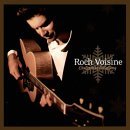 Not widely known outside his native Canada, Quebecois vocalist and guitarist, Roch Voisine remains one of Canada’s better kept secrets. Voisine pays equal mind to both his French and English speaking audiences releasing albums in both languages.
Not widely known outside his native Canada, Quebecois vocalist and guitarist, Roch Voisine remains one of Canada’s better kept secrets. Voisine pays equal mind to both his French and English speaking audiences releasing albums in both languages.
